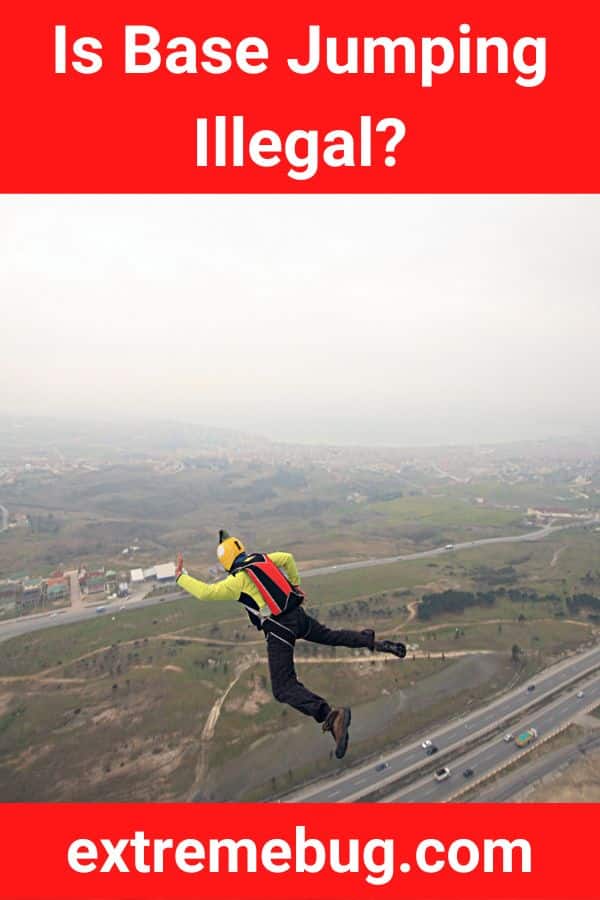Base jumping is a pretty scary sport on the face of it, and as you would expect with any such activity, you probably can’t just go out and do it wherever and whenever you want.
But what are the actual legal ins and outs of base jumping?
Is it illegal?
Base jumping is not illegal in most places. There are naturally, cases where it is illegal, and it almost always needs to be authorized and carried out only in specified places. You can’t legally jump from a building without the owner’s permission, for instance. But it’s not outright illegal by any means.
While base jumping isn’t illegal in and of itself, it is also something that is illegally undertaken in many cases.
Thrill seekers want the thrill both of the jump and also of the fact they are doing it illegally.
They might have found a spot where they just can’t resist jumping.
Let’s find out more.
Is base jumping illegal in the US?
Base jumping is not outright banned across the US, nor is it a federal crime.
There are many legal avenues to base jumping, but doing so without following the proper channels can be a very serious crime.
I’ll get into the exact penalties later, though they do vary from place to place.
Just be aware that while base jumping is not illegal in the US, it’s also not legal everywhere and in all situations.
Just like with skydiving or other extreme sports, laws are in place to ensure that base jumping is done safely and responsibly, by people who are experienced in the practice.
So, as I said, base jumping is not a federal crime in the US.
There are, however, many local laws dictating just how, where and under what circumstances base jumping can be done.
Let’s find out where it is legal to base jump.
Where is base jumping legal in the US?
In most states, base jumping is legal in some capacity.
Of course, you can’t just do it anywhere, at any time.
You’ll need to do it with someone who has a permit, which is usually only going to be granted to experienced instructors.
Local laws will dictate where and under what conditions you can go base jumping.
It will vary slightly from place to place, so look up your local laws.
There is, however, one place in the US where you can actually base jump without a permit—Perrine Bridge, Idaho.
This bridge is roughly 450 meters high and is often considered a great training spot for new base jumpers.
This is the only place in the nation where you can base jump without getting permission first.
That said, I wouldn’t advise you just go ahead and jump—get some tutelage from an instructor first.
It’s also illegal in virtually every national park in the nation.
Base jumping at these locations became very popular but was quickly banned for obvious reasons.
Such jumping put other park tourists at risk.
So, you won’t be able to base jump at any scenic national parks.
Can I base jump anywhere?
No, you can’t—under any circumstances.
Except for that single location I mentioned where you can, legally, base jump without a permit, you will always need training and a permit to base jump.
There are also, as I mentioned, many places where it is outright illegal and there is no way to get a permit to jump there.
Base jumping is, by its very nature, incredibly dangerous.
This means that it must be well-regulated in order to keep everyone safe.
Again, it isn’t only the safety of the jumper that is at risk, but others on the ground, too.
But what is the penalty for illegal base jumping?
What is the penalty for illegally base jumping?
The penalty for illegal base jumping can vary a lot depending on the circumstances.
Often, it involves trespassing charges, depending on where you do it.
Whatever happens, you are very likely to incur a fine, which tends to average at around $2,000.
You will also most likely have your equipment confiscated.
You may be able to pay a further fine to retrieve it, or it may be seized and destroyed by the authorities.
If the jump itself is not illegal, rather you are just not properly licensed, then criminal charges may not be brought.
A fine is the most common penalty.
Why is base jumping illegal?
It’s mostly a case of personal endangerment issues.
Many people assume that if you are the only one you are putting at risk by your actions, then there’s nothing illegal about it.
But personal endangerment is very often a crime in many places.
Beyond that, though, as I said, you are potentially putting others at risk, depending on where you jump.
Landing on someone after a base jump could cause serious injuries for them.
The other issues, as I mentioned, is trespassing.
You’ll very often end up on private or restricted property after a jump, and this is one of the most common civil charges brought against unlicensed base jumpers.
So, while base jumping is not outright illegal, it’s also not as simple as saying it is just legal, either.
There are many cases and places where it is not legal to base jump.
If you want to engage in base jumping, it’s really important, if only for your own safety, that you only do so in legal situations.
You’ll be putting yourself and others at risk if you don’t.







